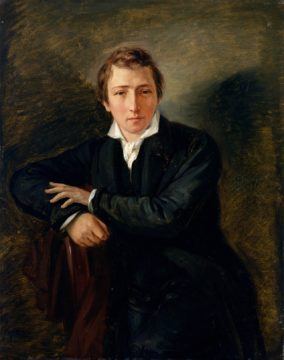Alex Ross at The New Yorker:
 In brief, the circumstances were these: Heine, a master of caustic wit and raw heartbreak, was in his early thirties and had found fame with his “Buch der Lieder” (“Book of Songs”), a collection of outwardly Romantic lyric poems with an ironic undertow that often escaped early readers. Platen bore a noble name—Count Platen-Hallermünde—but had grown up without financial advantages, serving in the military before turning to literature. He had won notice for finespun odes, sonnets, and adaptations of the Persian ghazal. Karl Immermann, a friend of Heine’s, had made cracks about pretentious poets who “vomit Ghaselen”; Heine quoted Immermann’s lines in one of his volumes of “Reisebilder” (“Travel Pictures”) that detoured into politics and literature. Platen, irrationally incensed by this run-of-the-mill literary sniping, struck back in a pseudo-Aristophanic comedy titled “The Romantic Oedipus,” deploying anti-Semitic epithets against Heine. The latter, in his next travelogue, “The Baths of Lucca,” unleashed a homophobic evisceration of Platen—which was widely viewed as overkill and caused considerable damage to Heine’s career. Platen, who already felt alienated from Germany and was based in Italy, said no more. He died of cholera six years later, in Syracuse, Sicily.
In brief, the circumstances were these: Heine, a master of caustic wit and raw heartbreak, was in his early thirties and had found fame with his “Buch der Lieder” (“Book of Songs”), a collection of outwardly Romantic lyric poems with an ironic undertow that often escaped early readers. Platen bore a noble name—Count Platen-Hallermünde—but had grown up without financial advantages, serving in the military before turning to literature. He had won notice for finespun odes, sonnets, and adaptations of the Persian ghazal. Karl Immermann, a friend of Heine’s, had made cracks about pretentious poets who “vomit Ghaselen”; Heine quoted Immermann’s lines in one of his volumes of “Reisebilder” (“Travel Pictures”) that detoured into politics and literature. Platen, irrationally incensed by this run-of-the-mill literary sniping, struck back in a pseudo-Aristophanic comedy titled “The Romantic Oedipus,” deploying anti-Semitic epithets against Heine. The latter, in his next travelogue, “The Baths of Lucca,” unleashed a homophobic evisceration of Platen—which was widely viewed as overkill and caused considerable damage to Heine’s career. Platen, who already felt alienated from Germany and was based in Italy, said no more. He died of cholera six years later, in Syracuse, Sicily.
more here.
